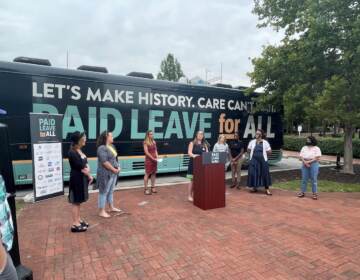Montgomery County announces strongest paid parental leave policy in Pennsylvania
Full-time county employees are eligible for 12 weeks of paid parental leave, and up to 16 in case of medical complications.
Listen 1:08
From left, Montgomery County Commissioners Tom DiBello, Neil Makhija and Jamila Winder pose for a photo after announcing the strongest paid parental leave policy in Pennsylvania. Makhija is holding his 9-month-old son, Avi, and Winder is holding her 3-year-old son, Max. (Courtesy of Montgomery County Commissioners)
From Delco to Chesco and Montco to Bucks, what about life in Philly’s suburbs do you want WHYY News to cover? Let us know!
On Thursday, Montgomery County commissioners announced a new paid parental leave policy for full-time county employees, expanding time offered to all parents to 12 weeks, and up to 16 weeks in the event of medical complications.
Montgomery County Commissioner Neil Makhija said the policy is specifically designed to include birthing and non-birthing parents, and extends to parents who are adopting a child or having a child through surrogacy.
“We’re making sure to leave it up to the family in terms of how they decide they’re going to raise their children,” Makhija said. “And I think what’s great is it does apply in surrogacy, adoption, as well as in natural births.”
The change will benefit the county’s 3,000 employees, 80 of whom have used the prior paid parental leave of six weeks.
Officials said the new policy is now the most extensive in the public sector in Pennsylvania. Pennsylvania has an eight-week policy, followed by Allegheny, Pittsburgh and Philadelphia counties, all of whom provide 6 weeks of paid parental leave.
County Commissioner and Chairperson Jamila Winder said her own experience as the parent of a young child informed the policy. She went through a C-section when she birthed her son Max, now 3, and had a complicated physical recovery. She was working in the private sector at the time and had to figure out with her husband how to take paid time off so they could spend time with their newborn child while continuing with their careers.
“It’s an adjustment for families, whether you’re the birthing parent, or the one that will be greeting your newborn when your new child comes home,” she said. “So we wanted to give equal credit and time to both parents at the time of delivery.”
Winder said the commissioners hope the private sector takes note.
“When you think about the lifeblood of your organization, which is your employees, these are the types of things that we need to do to show commitment and support of working families,” Winder said.
Attracting top talent to work with the county is one of the goals of the policy, Makhija said.
“I think that’s one of the reasons we’re all together on this, is it’s good policy for us as an employer to compete with the benefits that people see and other spaces and let people know that public service is an option, whereas they might have thought that they could only get these kinds of benefits in the private sector or elsewhere,” he said.
Tom DiBello is the county’s lone Republican commissioner. He supported the measure and said he hopes other local governments and the state government will replicate Montgomery County’s move.
“Hopefully, many state and local government agencies will see the policy that we put in place and follow this as we lead the charge,” he said.
For taxpayers concerned about the cost of extending paid leave time, DiBello said the policy actually has the potential to save the county money in the long term.
“What we generally don’t hear about is if we can’t retain an employee, and they leave, because we don’t have a policy in place to be able to support their needs, for us to go and backfill that position, it comes with a cost,” DiBello said. “There’s the cost of recruiting, there’s the cost of hiring, training. And ultimately, when it’s all said and done with, I would suspect that those costs will end up being a lot higher.”
Winder said this is the first of several policies the commissioners are working on together to support the county’s workforce.
“We’re trying to think creatively about how … do we retain good talent? How do we recruit for critical roles, especially roles like in our district attorney’s office, like in our public defender’s office, like our 911 operators, where they’re in that stage of their careers and life where they’re doing family planning,” Winder said. “So this will just make it more attractive both for people to stay as well as come to work here, so I’m really proud of the work that we’ve done as a team.”

Get daily updates from WHYY News!
WHYY is your source for fact-based, in-depth journalism and information. As a nonprofit organization, we rely on financial support from readers like you. Please give today.







